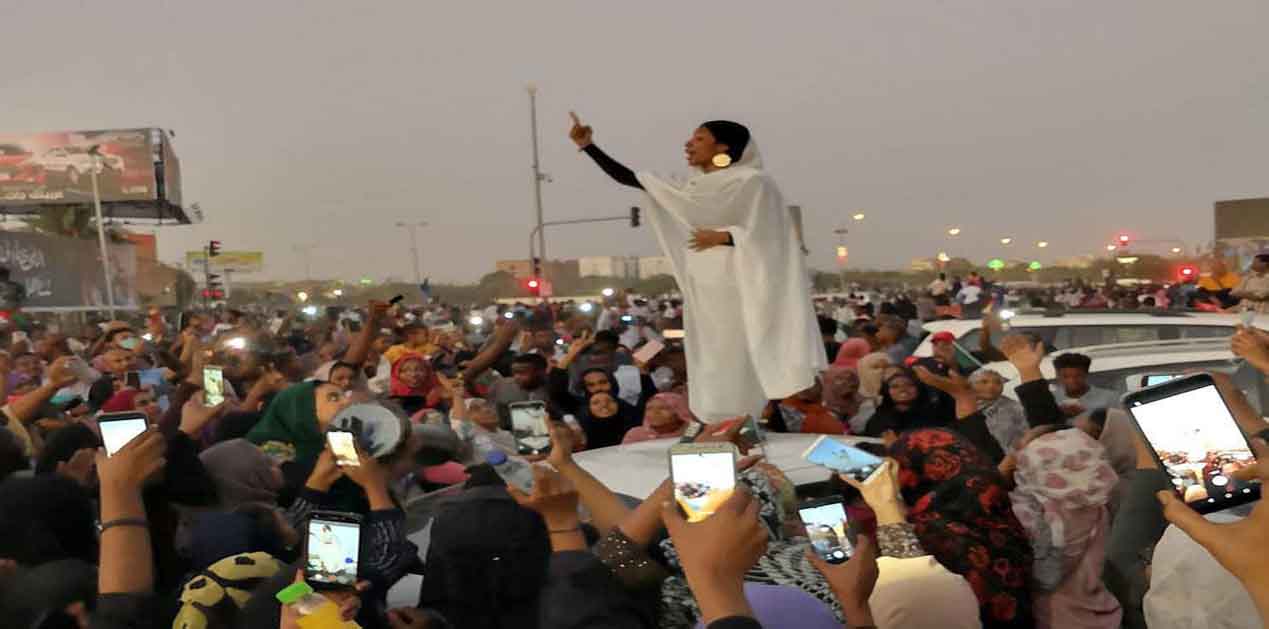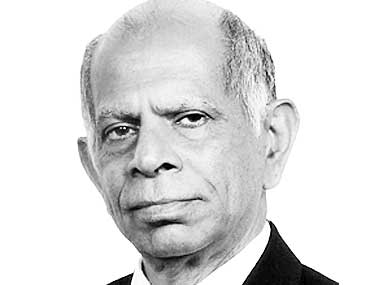We start with where Sudan is coming from. It is a young state with an impressively long history. The Kingdom of Kush in the region known as Nubia in antiquity had much interaction with ancient Egypt, and it provided a line of Pharaohs to the 25th dynasty that ruled Egypt from 744 to 656 B.C.
To fast forward history, Sudan was conquered by the Ottomans, or, more accurately by Egypt for the Ottomans, in 1821. The 1885 revolt against the foreign rulers gave rise to the rule by Mohammed Ahmed, the Mahdi (The Expected One), and his son lasting till the conquest by the British in 1899 when Lord Kitchner established the Anglo-Egyptian Condominium over Sudan.
Independence came in 1956. Independent Sudan started as a democracy, but in 1958 a military coup overthrew the civilian government. Following protests, democracy was restored in 1964. Sudan has alternated between military rule and civilian rule ever since. In 1989, Brigadier Omar Hassan Ahmed al-Bashir staged a coup against Prime Minister Sadiq al Mahdi, a descendant of the Mahdi mentioned above. It was against Al-Bashir's 30-year misrule that the current wave of protests started in December 2018. The protests were sparked off by a three-fold rise in the price of bread. But it will be wrong to say that the price rise alone caused the revolt.
Soon after independence in 1956, South Sudan sought autonomy causing two civil wars. The British had ruled the North and the South separately as they differed much from each other ethnically and otherwise. The first civil war lasted from 1955 to 1972, with a toll of about 500,000 lives. The 1972 Addis Ababa Accord provided for autonomy and the Constitution was suitably amended. However, the autonomy provisions were not implemented to the satisfaction of the South and the second civil war began in 1983. The toll was 2 million before it ended with the 2005 Nairobi Accord providing for a referendum on independence after six years of reinforced autonomy. The referendum was duly held and South Sudan seceded peacefully in 2011. Till then Sudan was the largest state in the continent. Now, it is Algeria.
About 70 percent of the oil wealth of Sudan is with the South. The impoverished North also had to face a rebellion in Darfur since 2005. Al- Bashir armed a group from a particular tribe called the Janjaweed who resorted to atrocities including rape and murder. The International Criminal Court issued an arrest warrant against Al-Bashir in 2009 for committing crimes against humanity, war crimes, and genocide in Darfur since 2005. The toll in Darfur was 300,000 with 2 million displaced.
Al-Bashir gave huge subsidies for food and fuel accounting for 35 percent of government spending. Inflation followed reaching a level of 70 percent in 2018. The ATMs started to run dry. Sudan was a police state with security forces keeping a sharp eye on dissent. Health and education services deteriorated. In alliance with orthodox Islam, Al-Bashir enforced the Sharia in a Draconian manner, deeply hurting and humiliating women. The bread price increase came on top of all this and people's anger and frustration exploded.
The first protest was not in the capital Khartoum, but in the Nile River city of Atbara on 19th December 2018. It coincided with the return from exile of the ousted Prime Minister Sadiq al-Mahdi. Al-Bashir resorted to violent suppression using the infamous Janjaweed. As the protests led by the well organized Sudan Professional's Association spread like wild fire despite protesters getting killed. The military stepped in and arrested Al-Bashir on 11th April, 2019.
The military produced a Transitional Military Authority (MTA) and announced that it would take the country to civilian rule in two years. The joy of the protesters over the fall of Al-Bashir turned to anger as they realized that it was a military coup. In short, it will be the system of Al-Bashir's arbitrary rule without Al-Bashir. The protesters demanded that the military hand over power to a civilian government. The military agreed to talks and it was agreed to have a joint council with both the military and the civilians in it. Both sides wanted a majority and the presidency of the Council. The talks broke down more than with the Declaration of Freedom and Change Forces (DCFC) representing the protesters. A DCFC spokesperson has claimed that when the talks broke down the two sides were about to reach an agreement on a formula of equal seats and a rotating presidency.
The 3rd June raid by the Rapid Support Force (RSF) on the protesters staging a sit-in in front of the military headquarters and protesting elsewhere marked a turning point. The sit-in has been going on since 6th April. The toll as known on 3rd June was 13 dead and 116 injured. The latest toll given by the doctors is over 120, after 40 bodies were removed from the Nile. This is in contrast with the Health Ministry's figure of 61 dead. The RSF, composed of elements from the notorious Janjaweed, is led by General Mohammed Hamdan Dagalo, 44, known by his nickname Hemedeti. Though he led the Janjaweed in Darfur, the International Criminal Court has not charged him with any crime. The RSF raided hospitals and forced the medical staff to send away the wounded under treatment. There have been reports of rape too.
Hemedeti is the deputy chief of the MTC and some observers believe he is more powerful than the chief, General Abdel Fattah al-Burhan. The RSF has 50,000 men, better paid than the soldiers in the regular army, owing blind loyalty to their chief. The RSF has its own funds and the politically ambitious Hemedeti has spent $ 1 billion to import essential items to alleviate the shortages. He had spoken in favor of the protesters and against President Al-Bashir to whom he owes rise in the military.
Following the violent breakup of the sit-in, the MTC announced that it was suspending talks with DCFC and that an election would be held in nine months. The DCFC rejected the proposal to have that election and persisted in its demand for the MTC to hand over power to a civilian government. The latest is that the MTC has offered to resume talks with DCFC which has rejected the offer outright demanding immediate transfer of power to a civilian government.
Let us look at the role of the Africa Union (AU) and of external powers. The AU's current president is Egypt's President El Sisi who carried out a military coup against the democratically elected President Morsi in 2013. El Sisi does not want Sudan to move towards democracy. On 15th April AU's Peace and Security Council asked the MTC to hand over power to a civilian government within 15 days. After that deadline, and prompted by El Sisi, the Council gave another 60 days. Obviously, the AU is not serious in the matter and in essence it supports the MTC. But, whether El Sisi tried to prevent it or not, the AU has suspended Sudan's membership pending return to civilian rule. There is hint of action against individuals. The mounting casualties from the 3rd of June compelled the AU to take action.
Apart from Egypt, the significant supporters of the MTC are Saudi Arabia and UAE. After the fall of Al-Bashir, Saudi Arabia and U.A.E. offered $ 3 billion to Sudan as a mark of support to MTC whose chief and his deputy have kept close touch with the two Gulf Cooperation Council (GCC) states. A number of Sudanese are fighting in Yemen on behalf of Saudi Arabia and UAE, both engaged in chasing the mirage of military victory. It was Hemedeti who took the lead to send troops to Yemen.
The West came out with statements critical of the use of force by the military against protesters. But the West has no united plan of action. UK and Germany took the matter to the Security Council which held a closed door session on 4th June when the known toll of the crackdown of the 3rd June was 40. The UK and Germany wanted a statement - not a resolution - condemning the use of force against protesters and calling for a return to the negotiating table. But China and Russia stood in the way and US did mot lend its support to the UK-German move. The European members of the Security Council (Belgium, Britain, France, Germany, Italy, Poland, The Netherlands and Sweden) said in a statement that the military council's "unilateral announcement to cease negotiations, appoint a government and call for elections within a short period of time is of great concern." They called for "an agreed transfer of power to a civilian-led government as demanded by the people of Sudan."
Obviously, such statements by the European powers will not have much of an impact on the ground. The moves by Egypt, Saudi Arabia, and UAE will have more impact. When the last two offered $3 billion, the protesters had shouted, " Keep Your Money". Incidentally, the U.A.E. which had kept quiet when the MTC canceled talks with the DCFC on 4th June, has now called for talks after the DCFC rejected the talks.
We cannot predict what will happen. But, there are two possible scenarios. One, the MTC as a whole or a part of it will try to take the El Sisi route and retain power with the military with a democratic facade put on it. The other scenario is Sudan moving towards democracy. The DCFC has shown remarkable grit and determination by keeping the momentum even during the fasting days. As noted, the ousted Prime Minister Sadiq al-Mahdi is back from exile. It is not beyond the realm of possibility that if the DCFC persists, the MTC will have to agree willy-nilly to the former Prime Minister's forming a civilian cabinet charged with holding an early election. That obviously will be the best outcome. If Hemedeti steps down or is expelled from the MTC, it will facilitate progress.
External help in mediation will help. Ethiopia is engaged. Let us wait and watch.
(The paper is the author’s individual scholastic articulation. The author certifies that the article/paper is original in content, unpublished and it has not been submitted for publication/web upload elsewhere, and that the facts and figures quoted are duly referenced, as needed, and are believed to be correct). (The paper does not necessarily represent the organisational stance... More >>
Image Source: https://static.independent.co.uk/s3fs-public/thumbnails/image/2019/04/10/14/download-0.jpg?w968h681










Post new comment